The 19th Century
Nineteenth Century Masters
- 1768 to 1814 Joseph Hall straddles the centuries.
- 1818 to 1857 James Inman
James Inman was in office at the introduction of the 1855 regime and the register he opened in 1818 was closed and a new one opened. - 1858 to 1879 Richard Dunkley Beasley [Ushers F H Jones; E Fynes-Clinton].
Richard Beasley had a brilliant career at Cambridge where he was the sixth Wrangler in his year. He had been a pupil at the school before transferring to Rugby School. The numbers of pupils increased under his stewardship but there was a tendency for them to leave early, probably to move to schools offering scholarships and exhibitions to universities. It was at this time that the Castlegate Block was added to increase the number of classrooms and the entrance to the school was from Castlegate instead Church Street. With that entrance, the field on Castlegate down to the river became the games field. The boarders lived in the Master’s house (the present administrative building). The Drawing Master, W H Cubley, was appointed and stayed for 31 years. Both he and Edward Montague Browne had served under the previous Master; Cubley served under the next two and Browne the next three. A Drill Master, Sergeant Major Peters, was appointed at £310 p.a. which was the beginnings of Physical Education, the O.T.C and C.C.F.
National Reports on the state of schools were published in 1861 and 1864 leading to the Endowed Schools Act of 1869 and the Education Act of 1870. These led to the new Scheme of Governance in 1876 and the establishment of the Board of Governors to replace the Trustees. - 1879 to 1887 Ernest George Hardy 1879 to 1887 [Usher F Hollins]
Ernest Hardy organised the school in the light of the 1876 Scheme.
He was an academic and when he left the school in 1887 he took a post of tutor in Jesus College, Oxford, eventually being appointed Principal of the College.
The English Department, which had been a separate department where boys paid a fee, was incorporated into the main syllabus.
The hours devoted to each subject in each year was published and appeared in the Grantham Journal of the day, as do much of the school’s activities. Half days on Thursday and Saturday each week were devoted to drill and games.
From 1880 to 1884 the number of pupils increased from 48 to 85. In 1885 the school contained 61- day boys 14 boarders in school and 6 boarders with Mrs Pidcock who ran a small boarding house for the school in a house in Manthorpe Road. In 1881 Ernest Hardy reported to the Governors that parents could be divided into four equal divisions “Farmers, Grantham Tradesmen, Professional Classes and none of these”. But numbers continued to decline. This was a time of depression and the Governors were obliged to reduce the rents of the farms and the school income dropped. - 1887 to 1898 William John Hutchings [Usher Samuel R Brooke]
The expansion of the syllabus continued with the introduction of some commercial and technological subjects. County Councils were created in 1888 and each was responsible for education in its area. The Technical Education Act was passed in 1889 allowing the councils to levy a one-penny rate to fund Technical Education.
The British School closed in 1895 and the school bought it but boarded it up for three years. Generally things did not improve and the Governors looked to replace William Hutchings. He resigned in spring 1899 but asked to be relieved by Christmas 1898. The Governors agreed and inadvertently triggered a furore that had national repercussions. William Hutchings left in late 1898.
The masters on the staff under William Hutchings were Samuel R. Brooke, Vincent Marindin and George Wooler Preston. T hey arrived at school after the Christmas holiday, 1898, to be told that they were no longer required at the school. They were told that the previous Head Master had appointed them and their own appointment terminated with his. It seems likely that had William Hutchings served out his contract and left at Easter 1899 he would have given the assistant master one terms notice in January 1899 and they would have left with him or been re-engaged at Easter. These masters, however, were not given notice of termination of contract. At their next meeting the Governors passed a resolution regretting the masters’ situation and in compensation voted that “there be given to them an Honorarium of £80 to Mr Brooke, £25 to Mr Marindin and £50 to Mr Preston”.
The Assistant Masters’ Association and the Association of Head Masters contacted the Charity Commissioners for clarification on the position of assistant masters when a Head Master left or died. The Charity Commissioners set up a public enquiry to be held in the Guild Hall, Grantham, in May 1899. The teaching associations regarded this as an important enquiry from a national viewpoint. [The full transcript of the enquiry was published in the Grantham Journal].
In August the Commission declared that the engagements of the assistant masters were not ipso facto terminated with the resignation or death of the Head Master. They also declared that the Governors had no authority to award honoraria and that the surplus over the one term salary in lieu of notice given to the masters should be returned to the Charity Funds. The Governors objected and the matter lingered on until late 1900 when the Commissioners let the matter drop.
George W. Preston took a post at Sedgebrook School until it closed in 1919, he then moved back to this school until he retired in 1923. - 1899 to 1906 William Rogers Dawson [Ushers F V C Serjeant; W A Renwick; J L Lister].
The regime of 1855
The scheme of 1855 laid down the duties of the Trustees and their Clerk as well as the financial and accounting regulations. Fees were to be paid for the first time. The name of the school lost the word “Free”. The Trustees were to appoint a Head Master and a Second Master at all times and a Third Master when necessary. Their salaries were set and included a clause for a reduction of £35 for each pupil by which the total number of Day Boys dropped below 25. Provision was made for the appointment of masters to teach French and Engineering.
Masters were not to receive “fees, payments or gratuities” from the boys and the Master was not to have any “Benefice having a cure of souls”. All masters, except French and German teachers were allowed to take boarders.
Surplus income from the estate rents was to be used to expand the teaching within the school and provide University Exhibitions for the most able scholars. Monies were set aside for prizes and for the fees of an examiner, usually a fellow of Corpus Christi College, Oxford.
The list of subjects to be taught was formidable: “Principles of Christian Religion; Greek, French and German languages and literature; Principles of Natural Philosophy; Land Surveying, Drawing and Design; Mathematics, Algebra and Arithmetic; General English Literature and composition; Sacred and Profane History; Geography; Writing”, and other subjects “the Trustees may seem expedient”. All with a staff of six or so masters.
The longest section was concerned with the mechanism to remove masters. James Inman was in office at the introduction of this scheme and the register he opened in 1818 was closed and a new one opened.







